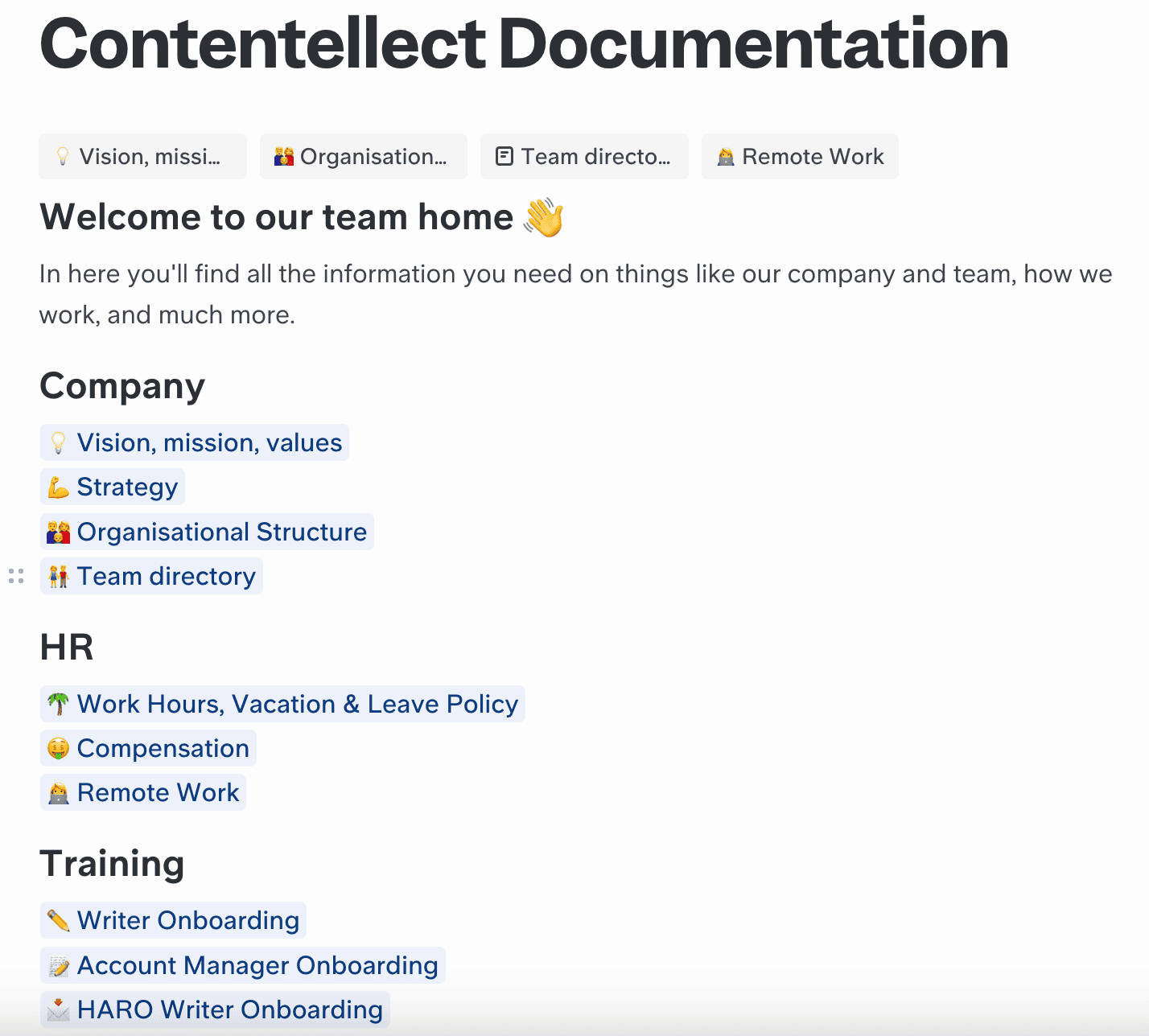Are you looking for the best tips and tricks for remote work management? You’re in the right place!
And don’t worry—you’re not alone in looking for ways to make remote teams work. Fierce Inc. found that 86% of respondents cite ineffective collaboration and teamwork as the main reason for workplace failures.
As a lifelong remote worker, I’ve picked up several excellent remote work management tips and tricks.
From setting clear objectives to building a remote work culture, I’ll show you the ropes.
Ready? Let’s roll.
11 Best Practices To Manage Your Remote Work Teams
Here are my 11 best practices to manage your remote work teams:
- Set clear objectives.
- Document everything.
- Use the best tools.
- Overcommunicate.
- Respect time zones.
- Focus on flexibility.
- Encourage socialising.
- Do virtual team-building.
- Recognise and reward hard work.
- Provide training.
- Build a remote work culture.
Ready for a deep dive? Join me as I explain these tips and tricks for making remote teams work.
1. Set Clear Objectives

Replying to emails take effort
Let’s start with the simplest yet most profound secret I’ve learned by managing remote work teams: you’ll always get lost without clear objectives.
Clear objectives ensure that everyone works together as a remote team. This improves remote work productivity and provides measurable metrics.
My pro tip? Use those metrics to celebrate the successes, discover roadblocks, and find ways to improve your workflows.
Some measurable objectives could include the following:
- Complete project X by date Y.
- Make 5 sales in 7 days.
- Publish 11 new blog posts by the end of the month.
However, managing a remote team goes beyond setting measurable objectives. You need to build workflows that will keep your employees on track.
2. Document Everything
You’ll need documents detailing our team’s workflows and processes to further improve your remote work management style.
Bonus points if you can build step-by-step guides on how to perform specific tasks within your organisation. Think of tasks like how to publish a blog post on your website, how to do research, or even how to assign work to coworkers.

An example of our Contentellect employee handbook.
These documents can be used to onboard new employees.
However, they are mainly intended to ensure that employees can continue to work and be productive, even when communication is poor.
And on the topic of poor communication, there are ways to overcome those challenges of remote work.

Discover how to slash your salary costs by 80%
Get our exact process for hiring amazing overseas talent from South Africa. Includes copy-and-paste templates and a detailed salary guide.
3. Use The Best Tools
Every remote work team’s success depends on the quality of their tools, software, and systems.
Excellent tools will improve communication and productivity and ensure shit gets done.
You don’t want complicated remote work tools to slow down your team. At the very least, you’ll need the following:
- Slack for communication.
- Gmail for sending emails.
- Google Workspace for collaboration.
- Notion for project management.
- Loom: for video recording.
- Canva for design.
Remember to document how your team must use these tools. You can’t assume every employee is familiar with all the remote work apps available.
Hire remote talent from South Africa & slash salary costs by 80%
Salaries start from £8,000 per year!
4. Overcommunicate
Everyone has a different communication style. While managing remote work, I’ve learned that it’s always best to overcommunicate.
What do I mean by overcommunicating? I’m talking about:
- Regular updates, whether on projects, company goals or changes.
- Weekly meetings where team members can share their progress pain points and ask questions.
- Monthly reports are also needed to ensure everyone is up to speed on projects, goals, and future tasks.
I’ve found that a brief, weekly round-robin is excellent. It encourages my team to explain their current work projects and gets everyone involved with the company’s success.
It sounds like a lot of meetings, but it isn’t. Here’s what I suggest:
- A weekly Monday check-in with line managers,
- A monthly team meeting for reporting on KPIs,
- A 6-month one-on-one employee review.
While we’re on the topic of setting up regular meetings to make remote teams work, you must always respect time zones.
5. Respect Time Zones

Every Time Zone is a great remote work tool.
Hiring remote employees means some of them may not share your time zone. As a manager or team leader, you must respect these time differences.
For example, don’t schedule a Monday morning meeting for 10 am EST if it’s going to be 7 am for your Pacific Coast employee.
By respecting time zones, you tell your team members that the company values them. They will feel more motivated and loyal towards a company that respects and values them.
Here’s a pro tip: Use a tool like Every Time Zone to manage different time zones like a boss.
Now, let’s talk about flexibility.
6. Focus On Flexibility

I love having flexible working hours!
I love being a remote worker because it allows me to manage my tasks to the best of my ability. The same goes for your employees.
Encourage this flexibility. After all, it’s one of the benefits of remote work that we all love.
So, how do you encourage this flexibility?
Start by setting measurable goals and objectives. An outcomes-based approach helps employees take ownership of their tasks without fear of being micromanaged.
Acuity Training found that 68% of staff working for a “micromanager” reported decreased morale. It gets worse. 55% of employees claimed it hurt their productivity.
Whether your employee is online for 10 hours a day or 4 hours doesn't matter.
What should matter is whether they meet their goals and produce good business results.
7. Encourage Socialising

Here you can see two of my coworkers chatting away in our #random channel.
Did you know that Made of Millions found that lonely workers reported feeling less productive?
And since we’re all working remotely, it can get lonely. So, how do you combat this loneliness?
Encourage general, random banter on Slack. You can also try to get together at least once a year.
This social interaction has several benefits! The National Institutes of Health found that being social can significantly increase productivity while lowering stress levels.
So, encourage that general banter. It reminds everyone that we’re more than virtual avatars and usernames.
8. Do Virtual Team-Building
Do you want to encourage socialising while incorporating some traditional team-building exercises? Try a virtual team-building event.

Contentellect's Halloween virtual event
These events have been proven to make managing remote work teams easier.
Why? They build camaraderie. Coworkers get to know each other better and can better support each other.
Here are some of my favourite online events you can use to build that team spirit:
- Online escape rooms,
- Learning hours,
- GIF battles
- And photo contents.
Another great way to manage a remote team is by keeping that team spirit high. Here’s how.
9. Recognise And Reward Hard Work
Did your team meet a deadline, launch a project, or seal a deal with a big client? It’s time to celebrate!
Think of creating employee rewards for achieving specific milestones. These could be anything from gift vouchers to cash incentives or even a remote office stipend.
Remember to include these rewards in your documentation. That way, everyone, old and new, will know management sees and appreciates them going above and beyond.
Don’t forget about work anniversaries and birthdays.
9. Recognise And Reward Hard Work

As a remote work staying productive is tricky
Did your team meet a deadline, launch a project, or seal a deal with a big client? It’s time to celebrate!
Think of creating employee rewards for achieving specific milestones. These could be anything from gift vouchers to cash incentives or even a remote office stipend.
Remember to include these rewards in your documentation. That way, everyone, old and new, will know management sees and appreciates them going above and beyond.
Don’t forget about work anniversaries and birthdays.
10. Provide Training
I firmly believe in providing my remote employees with training.
Remember, remote work management doesn’t come easily for everyone. Some folks may find it tricky to master new software (like Notion) or struggle with separating work and life.
Here’s how I’ve handled it, and I recommend you do the same to make your remote teams work.
Host monthly learning hours. Either invite an expert in or host the learning hour yourself. Topics could be anything from:
- Using software, systems and tools,
- Managing a healthy work-life balance,
- The latest advances in your industry.
These learning hours are great for making employees feel valued and appreciated. They’re a sign that the company is investing in their education and providing employees with career growth.
And this brings me to my final tip for managing remote work teams.
11. Build A Remote Work Culture

If every company accepts remote work as the future
40% of companies believe employees will quit to find employment with better perks and benefits. This is the truth. I’ve done it myself, and why wouldn’t I?
Building an excellent remote work culture is the key to retaining your top talent, and every tip I’ve shared here is part of creating a solid company culture.
Here’s the kicker: leadership shapes the culture. Every GIF you share and every word you use during meetings or on your Slack channels contribute to athis company culture.
And don’t worry—your company will benefit from a robust remote-first culture. Care.com found that a great company culture increases productivity by 53% and improves staff retention by 49%.
Now, those are numbers we can’t ignore.
My Final Thoughts
And there you have it! I’ve shared my 11 tips to master remote work management. Now, you know how to make remote teams work. Focus on my tips, and you’ll reap those rewards.
